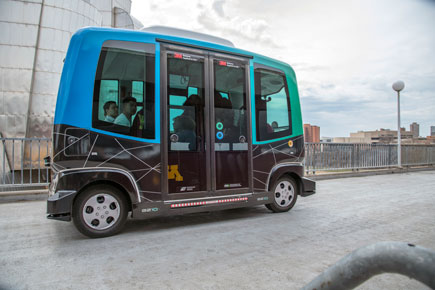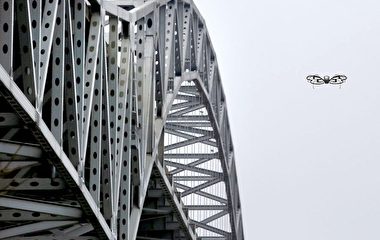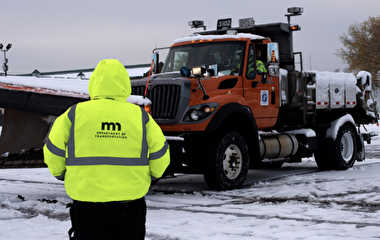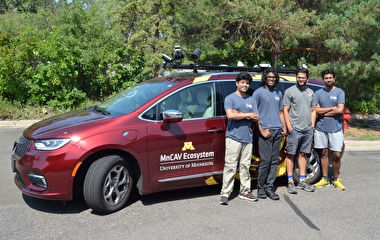With a new $1.75 million grant from the National Science Foundation (NSF), U of M researchers will focus on a critical challenge—how to leverage the emergence of automated vehicles (AVs) to rethink and redesign future transportation services and enable smart, connected communities where everyone benefits.
The three-year project, titled Leveraging Autonomous Shared Vehicles for Greater Community Health, Equity, Livability, and Prosperity (HELP), is one of 13 projects to receive an award as part of the NSF’s Smart & Connected Communities grant program this year.
Led by computer science professor Zhi-Li Zhang, the transdisciplinary project team includes five CTS scholars: Saif Benjaafar, industrial and systems engineering professor and director of the U’s Initiative on the Sharing Economy; Frank Douma, director of the State and Local Policy Program, Humphrey School of Public Affairs; Yingling Fan, Humphrey School professor; Tom Fisher, director of the Minnesota Design Center; and Alireza Khani, civil, environmental, and geo-engineering assistant professor.
The research envisions an ambitious “smart cloud commuting system” based on giant pools of shared AVs. “These smart cloud commuting systems have the potential to bring about far-reaching societal changes,” Zhang says.
“Using AVs in this way will provide inexpensive mobility services to all people, especially people with socioeconomic disadvantages,” Benjaafar says. “A system like this would help build stronger family and community ties, and boost economic productivity and equity by mitigating or removing mobility constraints.”
The researchers say the work will also include collaborators from across the state, with the aim of building stronger, smarter communities.
“The research will draw on innovative mobility field experiments under way in the Twin Cities region and will collaborate with several public, private, and civil society partners,” Fisher says. “These partners will include the cities of Minneapolis and Saint Paul, the Destination Medical Center in Rochester, the Minnesota Department of Transportation, the Metropolitan Council, and Metro Transit to design, plan, and analyze a shared AV system for greater community health, equity, livability, and prosperity.”
As part of the project, the research team will:
- Study the feasibility, economic viability, and architectural and operational designs of the envisioned smart cloud commuting system.
- Quantify system efficiency gains that can be attained from the intelligent control of AVs as well as from ride-sharing and smart trip scheduling of users.
- Develop optimization models and algorithms that account for essential tradeoffs, including cost, quality of service, and congestion in deciding how best to deploy AVs geographically and temporally.
- Investigate using economic models and likely scenarios of vehicle ownership and market structures to study the impact of each scenario on traffic measures including vehicle ownership and traffic volumes.
- Understand the social impacts of AVs on diverse populations and the effects they will have on land use and urban design as well as on economic opportunities in disadvantaged communities.
Ultimately, the project will result in policy recommendations, design guidelines, and quantitative analysis.
“We’re hoping that our work can inform local and statewide decision making for our cities and communities,” Fan says.




